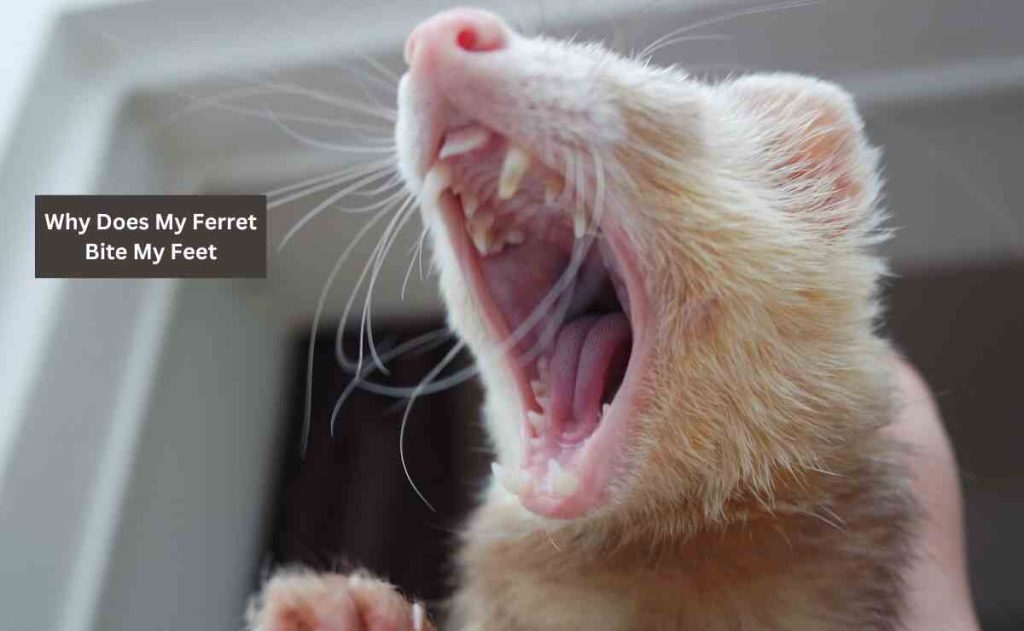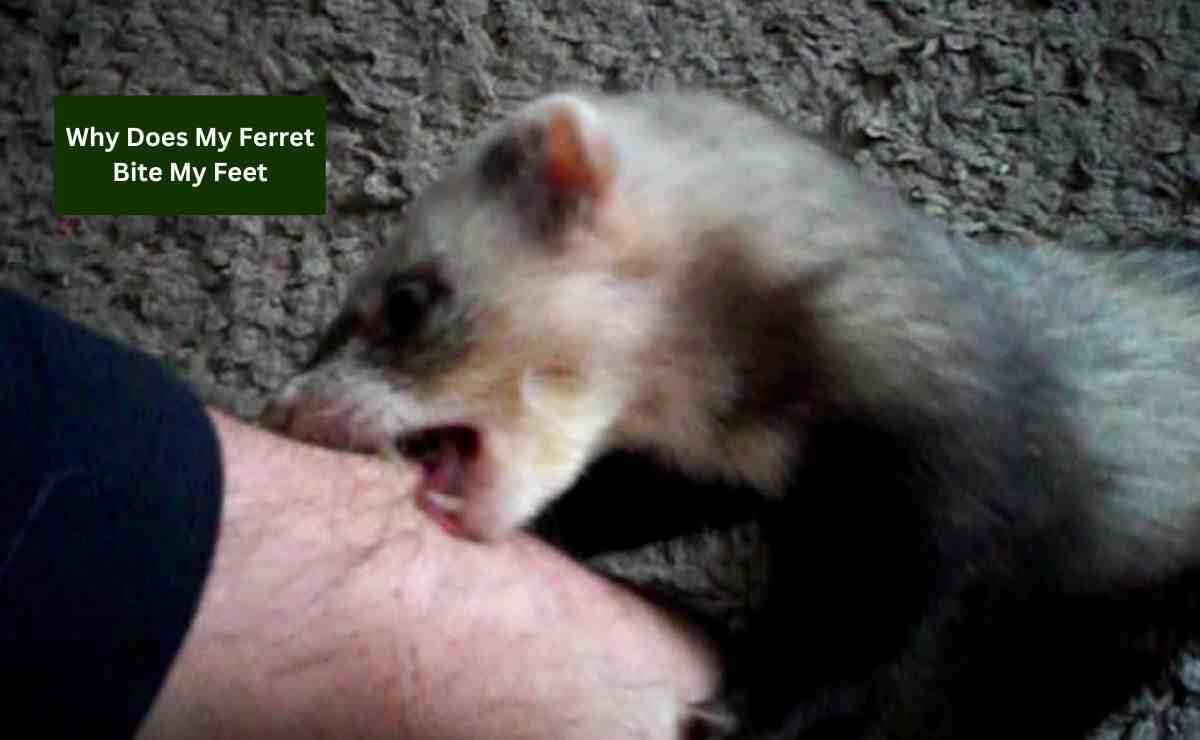Ferrets are known to be mischievous and curious creatures, and sometimes their playful nature can result in them nipping or biting at their owner’s feet. So naturally, you can ask why does my ferret bite my feet.
Ferrets look like innocent creatures, but their biting behavior can upset you. There are several reasons for this behavior. Sometimes they want to just get your attention and bite your feet as it is the only area they can reach. Sometimes they can bite in defense, in pain, or for some other reasons that you will know below in this post.
Why Does My Ferret Bite My Feet? 10 Major Causes

Ferrets sometimes surprise us with a bite. Veterinarians often categorize ferret bites into two main types: nibbles and nips. While nibbles are often playful or accidental, deliberate hard bites can cause wounds and escalate the situation.
Though the ferret’s bite is not serious, it can cause infections. Biting with sharp teeth can be painful. If it breaks the skin, bacteria can enter their mouths and lead to infection.
So let’s know 10 major reasons why ferrets bite:
1. Playful Explorations
Ferrets are natural predators, and their instinctual behavior involves mouthing and biting. This behavior is particularly common during playtime, as they see your feet as moving objects to chase and bite.
Also, ferrets have a keen sense of smell, and your feet’s scent may attract your feet, leading them to investigate and nip at them.
2. Seeking Attention
Ferrets are social animals that crave attention. Biting can be their way of signaling to be picked up or engaging in play. If you ignore them, they will bite as they’ve learned it’s a quick way to capture your attention.
3. Sensitivity to Odors
Ferrets are sensitive to odors and certain scents like perfumes or nicotine can trigger biting on your feet. Being cautious with smells and creating a familiar environment can prevent unwanted bites.
4. Invitations to Play
When you have a good connection with your ferrets, they want you in their playtime. Especially, baby ferret’s nip as an invitation to play, if you ignore their previous requests for interaction.
So you’ve to teach them gently that biting is not acceptable, as untrained kits grow into biting adults that pose risks to humans.
5. Fear Biting
If your ferrets weren’t trained or socialized properly as kits, they bite out of fear. If you react aggressively to their bites, it can worsen their behavior.
Like any other pet, ferrets thrive in environments where positive reinforcement prevails. Aggressive reactions can cause more fear, amplifying the chances of future fear-driven bites.
6. Dominance Behavior
Some ferrets show dominant behavior through biting, and asserting themselves as the boss. This behavior often stems from deep-seated insecurities and a lack of socialization. They want to dominate you and show who the boss is.
In this case, punishing them harshly won’t be effective as the concept is set in their mind that one bite can fix everything. If you punish them badly, they show more dominant behavior and bite your feet often.
7. Hormonal Changes
As ferrets grow, hormonal changes can lead to an increase in biting. Breeding males or those with adrenal disease can exhibit more biting tendencies. If your ferret starts biting suddenly, especially during its heat, consulting a veterinarian is essential.
8. Health Concerns
Ferrets that don’t respond appropriately or bite unexpectedly may be signaling an underlying health issue, including blindness or deafness. A vet check-up is crucial in such cases.
9. Building Trust
Building trust with a ferret takes time. If a ferret was roughly treated when young, it may bite. Consistent and gentle training over a few months can teach them not to bite, ensuring a safer interaction as they mature.
10. Lack Of Stimulation
Another possible reason for your ferret biting your feet could be insufficient physical and mental stimulation. Ferrets are highly active animals that require plenty of exercise and mental enrichment to stay happy and healthy. If your ferret is not getting enough physical activity or mental stimulation, they may resort to biting at your feet as a way to release their excess energy or boredom.
Nibbles and Nips: Find The Difference
For ferrets, biting is an inherent aspect of their playful nature, particularly during their lively playtime sessions. Using their mouths is simply their way of engaging. However, as ferret owners, our skin is not as resilient as theirs.
Ferret a mere playful nip may be nothing for their fellow ferret, but ferret bite can be a painful experience for the owners. There are two distinct types of bites to convey their intentions.
The first is the friendly and often gentle nip, a way of requesting playtime. Meanwhile, the sharper bites that can leave your feet stinging typically indicate that your ferret has reached its limit.
Young ferrets will nibble and nip at everything in their surroundings, including you. These gentle nips serve as a means to request playtime and establish social interactions. On the other hand, sharp bites tend to be more aggressive or caused by fear, signaling a need for space, or discomfort.
While both types of bites are natural, your rough behavior can lead to issues. especially if those initially gentle nips become less so in the excitement of play. So you have to focus on your ferret’s socialization and training.
Ferrets that have not been properly socialized or trained may exhibit problematic behaviors, such as excessive biting. If your ferret has not been exposed to a variety of environments and experiences, they perceive your ferret with toys or target for biting.
How To Prevent Ferrets From Biting You?
To prevent ferrets biting issue, there are several steps you can take. Firstly, ensure that your ferret is getting enough physical and mental exercise. Providing them with enough interactive toys, tunnels, and opportunities for playtime outside their cage can help them burn off excess energy and reduce the likelihood of biting behavior.
Also, you can provide appropriate outlets for your ferret’s natural hunting and chewing instincts. Investing in toys designed specifically for ferrets, such as rubber chew toys or interactive puzzle toys, can redirect their biting behavior onto appropriate objects.
Consistent training and socialization are also vital for preventing biting behavior in ferrets. Through positive reinforcement training techniques, teach your ferret basic commands such as “no bite” and reward them with treats or praise when they exhibit appropriate behavior.
Steer clear of physical punishments such as tapping on the nose, hitting, throwing, or using water spray. These methods not only fail to address the root cause but may worsen fear-based biting. Opt for gentler approaches like time-outs to correct behavior without escalating aggression.
If the biting behavior persists or becomes aggressive, it is recommended to consult with a veterinarian or an animal behaviorist for further guidance.
Final Thoughts
Biting is a natural behavior in ferrets that is often deeply rooted in their playful instincts. Many of their playful activities involve frequent nips and head shakes, a way of expressing excitement and engagement. When ferrets are in a playful mood or seeking attention, they may resort to nipping, often targeting areas like your feet due to their reach.
Still, ferrets are intelligent animals, and with patience, consistency, and proper training, you can help curb their biting behavior and create a good relationship with your pet.
